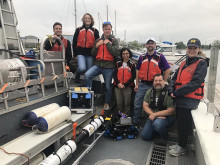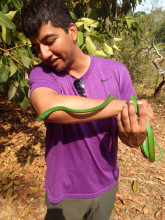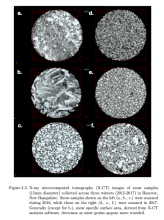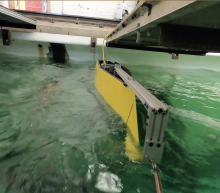Peter Cerda
Posts tagged with Data in Blog Bits and Pieces
Showing 1 - 10 of 15 items

In this interview, Anja Sheppard, Ph.D. Candidate in Robotics, describes her research with the Field Robotics Group and why she decided to share his data set entitled "Machine Learning for Shipwreck Segmentation from Side Scan Sonar Imagery: Dataset and Benchmark" in Deep Blue Data.

In this interview, Dr. Brandon Ponder, Ph.D., describes his research as a graduate student in the Climate and Space Sciences and Engineering Department and why he decided to share his data set entitled "The Venus Global Ionosphere-Thermosphere Model (V-GITM): A Coupled Thermosphere and Ionosphere Formulation" in Deep Blue Data.

In this interview, Dr. Amir Salaree (Research Fellow at the Department of Earth and Environmental Sciences) describes his research and why he decided to share his data set entitled "Supporting Data for Solving a Seismic Mystery with a Diver's Camera" in Deep Blue Data.

This post highlights one of the new members to the DBRRDS team! Peter Cerda is Data Curation Specialist for Workflows and Big Data.

This post highlights one of the new members to the DBRRDS team! Daniel Alexander is Data Curation and Research Reproducibility Specialist. He'll be working jointly with MIDAS and the DBRRDS team.

In this interview, Dr. Adam Rountrey is the Research Museum Collection Manager (Vertebrates/Plants) and 3D Specialist at the University of Michigan Museum of Paleontology (UMMP) describes his research on hormone levels in woolly mammoth and African elephants tusks. Several CT scans of these specimens are available in Deep Blue Data.
In this interview, Yingxiao Zhang (PhD candidate in the Climate and Space Sciences department) describes why she decided to share the data set entitled "Simulated historical (1995-2014) and future (2081-2100) pollen emission using PECM2.0" in Deep Blue Data.

In this interview, Dr. Adam Schneider (U-M alum; PhD in Atmospheric, Oceanic and Space Sciences 2018) described why he decided to share the data set entitled "Supporting data for the Near-Infrared Emitting and Reflectance-Monitoring Dome" in Deep Blue Data.

In this interview, Nate Clemett (Master's student in the naval architecture and marine engineering department) describes his research and why he decided to share his data set entitled "Flywheel Energy Storage System Roll Dataset" in Deep Blue Data.

In this interview, Dr. Wilkinson Daniel Wong Gonzales (U-M alum; PhD in Linguistics 2022) describes why he decided to share the data set entitled "The Lannang Corpus (LanCorp): A POS-tagged, sociolinguistic corpus containing recordings and transcriptions of Lannang speech collected from the metropolitan Manila Lannangs between 2016 and 2020" in Deep Blue Data.